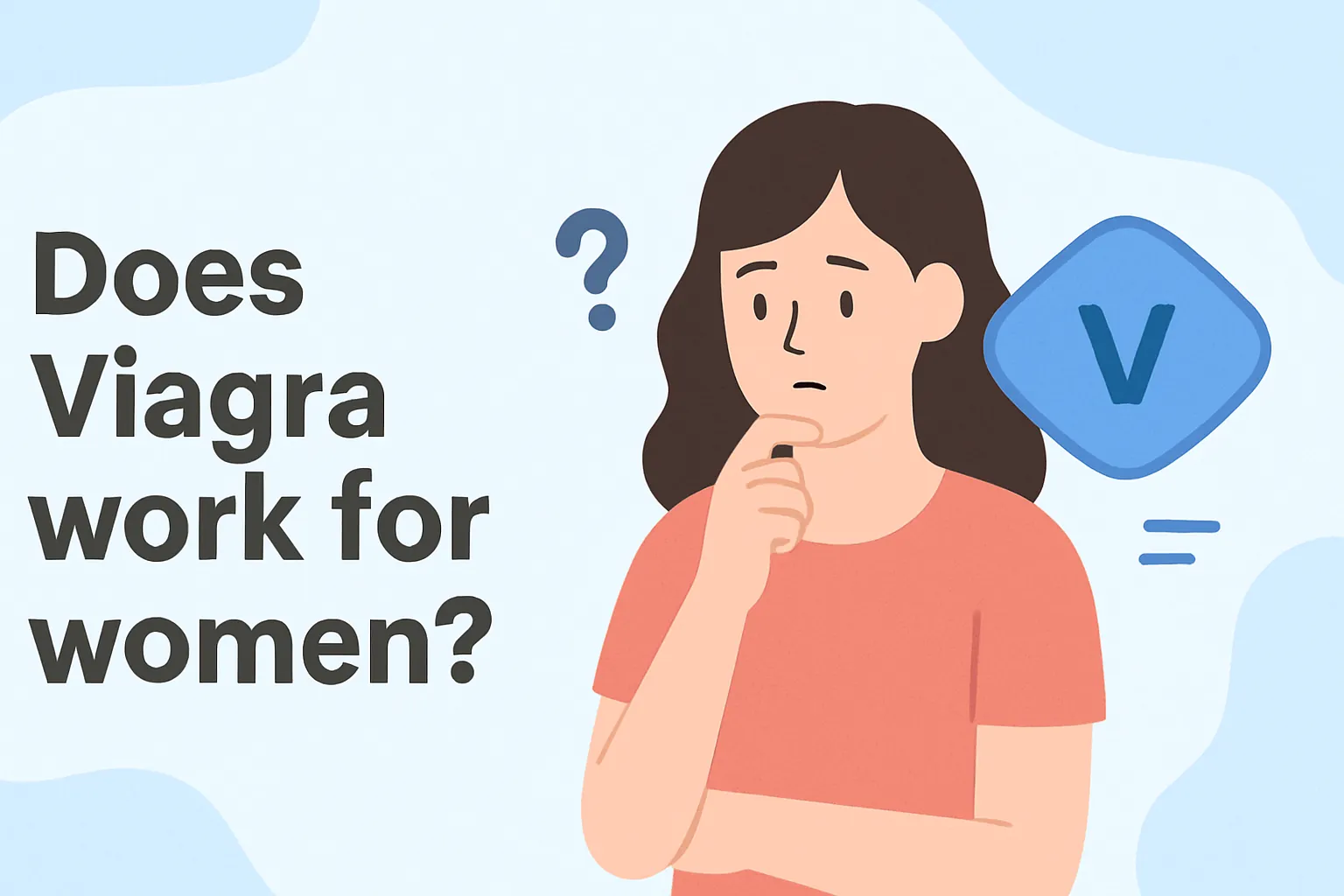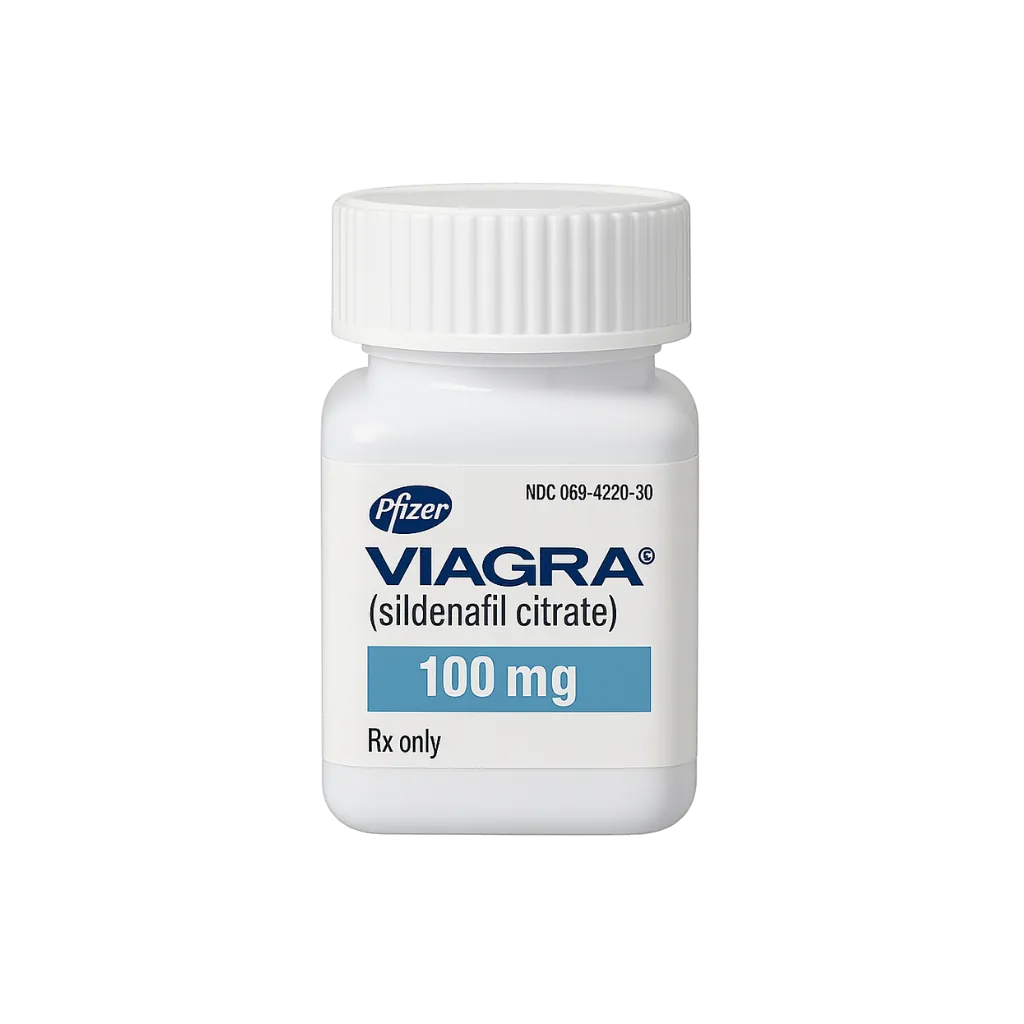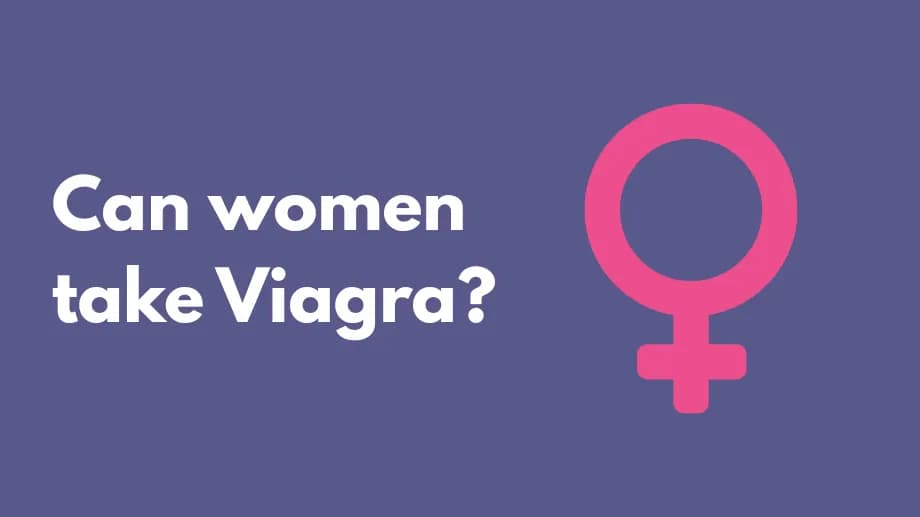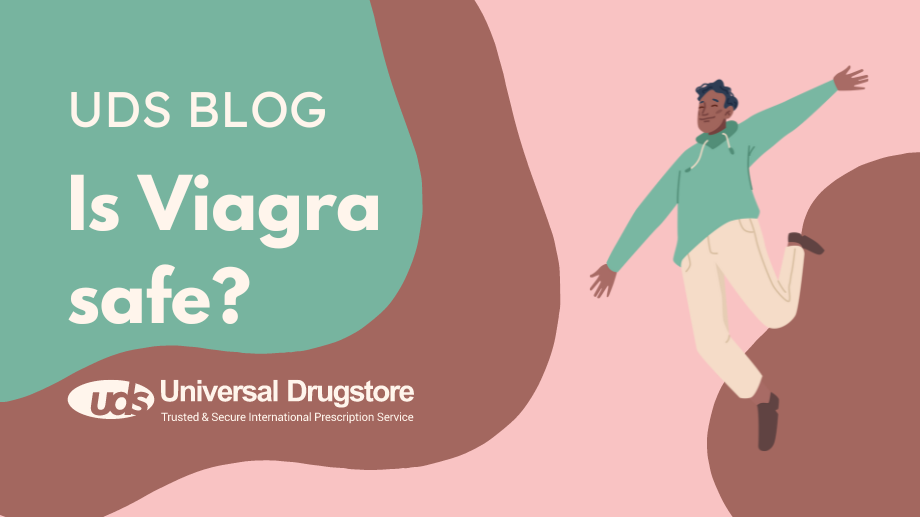Does Viagra work for women?

For many women, sexual desire goes up and down as they age and is often tied to relationship problems, stress, and hormonal changes that occur during pregnancy or menopause.
For men with sexual problems like erectile dysfunction (ED), Viagra (sildenafil) is an FDA-approved treatment that has been used for decades. Can women take Viagra to help with low sex drive? It is not approved for female sexual dysfunction, although some women may have it prescribed off-label by their healthcare provider. There have been some studies and clinical trials that looked at the use of Viagra in women experiencing female sexual arousal disorder (FSAD) and hypoactive sexual desire disorder (HSDD). However, the results have been very mixed. One study in postmenopausal women reported better overall sexual satisfaction in those who took Viagra when compared with those taking a placebo. Their enhanced sex lives included better arousal, vaginal lubrication, and orgasm. However, another study compared Viagra to placebo in pre- and post-menopausal women. There was no significant difference found in either group.
Viagra has shown benefits for women taking medications for depression such as selective serotonin reuptake inhibitors (SSRIs). This is because SSRIs can cause sexual dysfunction as a side effect. Studies suggest that women taking Viagra before sex may experience fewer unwanted sexual side effects from an SSRI.
There are a few FDA-approved medications to treat low sexual desire in women. One medication, Addyi (flibanserin), is sometimes called the “female Viagra”. It is approved to improve low libido in premenopausal women. Vyleesi (bremelanotide) is an injectable medication that is also approved for premenopausal women with low sexual drive.
If you are concerned about your sexual health, you should contact your healthcare provider for advice and information about the possible causes and treatments.
Keep reading and learn important information about Viagra while we answer some frequently asked questions.
Viagra FAQs
What is Viagra?
Viagra is an oral brand-name medication that is also known as the “little blue pill”. It is approved by the U.S. Food and Drug Administration (FDA) to treat men with erectile dysfunction (ED). With ED, you’re unable to have or maintain an erection. Like other treatment options in its class of medications, Viagra only works if you combine it with sexual arousal.
How does Viagra work for men?
The active ingredient in Viagra, sildenafil citrate, is a PDE-5 inhibitor. Phosphodiesterase type 5 (PDE-5) is an enzyme (protein) in your body that breaks down the molecules that normally cause an erection. When it blocks PDE-5, Viagra widens your blood vessels to allow more blood flow to your penis, which is important for sexual function. However, Viagra will not work without sexual stimulation. For most people, Viagra works the first time they use it. But for other people, they may need to take it a few times to get the desired effect.
What happens if a woman takes Viagra?
In men, Viagra increases blood flow to the penis to help achieve and maintain an erection. In women, it may improve blood flow to the labia and clitoris of the vagina. This can lead to increased lubrication and stimulation, which would be helpful in postmenopausal women with vaginal dryness.
What are the side effects of Viagra?
The most common side effects of Viagra in clinical trials with men when compared to placebo include:
- Headache
- Flushing
- Indigestion
- Changes in vision or light sensitivity
- Nasal congestion
Some other possible side effects of Viagra may include:
- Back pain
- Dizziness
- Muscle ache
- Nausea
- Rash
Rarely, Viagra may cause serious side effects such as:
Severe, life-threatening allergic reactions with symptoms such as:
- Hives
- Swelling of your face, lips, tongue, or throat
- Trouble breathing
Cardiovascular problems
Sexual activity is not recommended for people with certain heart-related conditions, such as serious heart failure. Therefore, Viagra should not be used. Also, Viagra has not been studied in people who have had recent heart attacks or strokes. If you have a heart condition, ask your healthcare provider whether Viagra is safe to use.
Low blood pressure
Taking Viagra with medications such as alpha-blockers, high blood pressure medications, or Norvir (ritonavir) can cause a severe drop in your blood pressure. Be sure your healthcare provider is aware of all medications you take before starting Viagra. You may need to check your blood pressure regularly if you take Viagra while on these medications. Also, be very careful getting up from a sitting or lying down position since this can make you feel dizzy and more likely to fall.
You should avoid taking Viagra if you are on a nitrate medication such as nitroglycerin or isosorbide dinitrate for chest pain (angina) because the combination can cause your blood pressure to drop suddenly to unsafe levels.
Prolonged or painful erection
Although rare, there are reports of erections lasting longer than 4 hours in some people taking Viagra. If not treated in time, this can lead to permanent damage to your penis. You are at higher risk for these side effects if you have other medical conditions affecting your penis, or if you have leukemia, sickle cell anemia, or multiple myeloma. Seek immediate medical attention if you have an erection that lasts longer than 4 hours or if you experience pain during an erection.
Shop Medications
Vision loss
Sudden loss of vision in one or both eyes while taking Viagra can be a sign of a serious eye problem called non-arteritic anterior ischemic optic neuropathy (NAION). If you suddenly notice blurred vision or other vision changes in one or both eyes, go to the emergency room or call your healthcare provider right away.
Hearing loss
Some people taking Viagra reported experiencing sudden hearing loss. Some people may also have ringing in their ears (tinnitus) or dizziness. Call your healthcare provider or seek immediate medical attention if you notice changes in your hearing in one or both ears.
Disclaimer: These are not all the possible adverse effects of Viagra. You should always seek medical advice from a healthcare professional for any questions or concerns about your medical condition or treatment. You should also read all the patient information, including your Medication Guide that comes with Viagra. You can report side effects to the FDA at 1-800-FDA-1088 or www.fda.gov/medwatch.
Are there side effects if a woman takes Viagra?
In the few studies of women taking Viagra, the side effects included:
- Headache
- Flushing
- Nasal congestion
- Visual changes
- Heart palpitations
- Indigestion
Who should avoid Viagra?
You should not take this medication if:
- You have an allergy to sildenafil or any inactive ingredients in its formulation.
- Take medications called nitrates (such as nitroglycerin)
- Use street drugs called “poppers” such as amyl nitrate, amyl nitrite, or butyl nitrate
- Take medications called guanylate cyclase stimulators such as Adempas (riociguat)
What does your healthcare provider need to know before taking Viagra?
You should be sure your healthcare provider is aware of all your health conditions as you may need increased monitoring or dose adjustments during treatment. This includes:
- Current or previous heart problems such as an irregular heartbeat, heart attack, chest pain, heart disease, heart failure, or other heart conditions
- Heart surgery within the last 6 months
- Stroke
- Pulmonary hypertension
- High blood pressure or low blood pressure that is not controlled
- An erection lasting longer than 4 hours (priapism)
- Have a deformed penis shape (Peyronie’s disease)
- Blood cell problems such as leukemia, multiple myeloma, or sickle cell anemia
- A rare genetic eye condition called retinitis pigmentosa
- Severe loss of vision
- Bleeding problems
- Stomach ulcers
- Liver problems
- Kidney problems or are on dialysis
Can Viagra be taken with other medications?
When Viagra is taken with other drugs, it can change how they work or make some side effects more likely or severe. You should ask your healthcare provider if any prescription drugs, over-the-counter (OTC) medications, vitamins, or supplements you take cause drug interaction with this medication:
- Viagra can cause a severe drop in blood pressure if taken with nitrates, alpha-blockers, and anti-hypertensives
- CYP3A4 inhibitors such as ketoconazole, ritonavir, erythromycin, or itraconazole can put you at a higher risk of side effects if taken along with Viagra
What is the female equivalent of Viagra?
For years there were no FDA-approved medications to improve a woman’s sexual experience. It is estimated that 40% of women have some form of sexual dysfunction. There are now a couple of FDA-approved medications to help treat this condition.
Addyi (flibanserin) is an oral medication that is used to treat low sexual desire in women before menopause. Once a treatment for depression, it may increase a woman’s sex drive by balancing neurotransmitters in the brain such as dopamine and norepinephrine (both responsible for sexual excitement), while decreasing levels of serotonin (which can lower your sex drive). It is typically taken once daily at bedtime. Some of the most common side effects of Addyi include dizziness, drowsiness, nausea, dry mouth, and insomnia. It may cause severe low blood pressure and fainting in people who take it with alcohol or who have certain liver conditions.
Vyleesi (bremelanotide) is an injectable medication that is taken at least 45 minutes before having sex. You can only take one dose in 24 hours and no more than 8 doses per month. Vyleesi targets melanocortin receptors, which are linked to sexual function. Side effects of this medication can include nausea, vomiting, headache, and injection site reactions.
What is a natural Viagra for females?
Several supplements claim to be natural alternatives to Viagra that can increase sexual pleasure in women. Most of these supplements have not been well studied and they are not FDA-approved for their safety and effectiveness. It is important that you talk with your healthcare provider before starting any of the following supplements to help improve your libido:
- Korean red ginseng
- Ginkgo biloba
- Red clover
- Maca
- Tribulus Terrestris
- Ashwagandha
Some other natural remedies to help improve sexual function include therapy, regular exercise, a healthy diet, and mindfulness or other stress-reducing techniques.
Related medications
- Cialis (tadalafil)
- Levitra (vardenafil)
- Stendra (avanafil)
- Caverject (alprostadil)
- Caverject Impulse (alprostadil)
Sources
- DailyMed
- Medscape
- Prescriber’s Digital Reference
- National Library of Medicine
- Nurnberg HG, Hensley PL, Heiman JR, Croft HA, Debattista C, Paine S. Sildenafil Treatment of Women With Antidepressant-Associated Sexual Dysfunction: A Randomized Controlled Trial. JAMA. 2008;300(4):395–404. doi:10.1001/jama.300.4.395
- Alatas E, Yagci AB. The effect of sildenafil citrate on uterine and clitoral arterial blood flow in postmenopausal women. MedGenMed. 2004 Oct 13;6(4):51. PMID: 15775878; PMCID: PMC1480594







